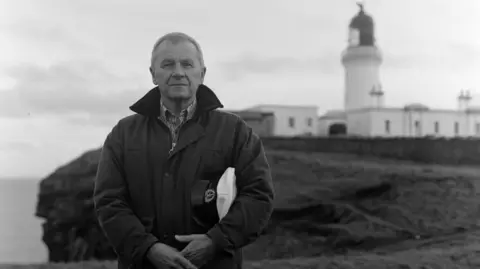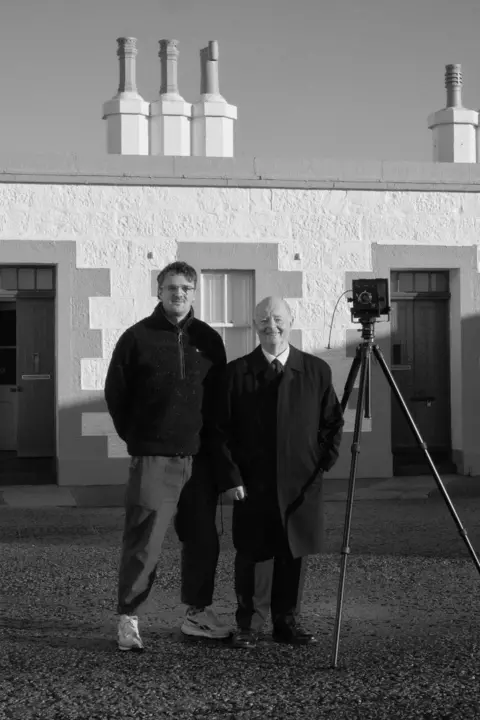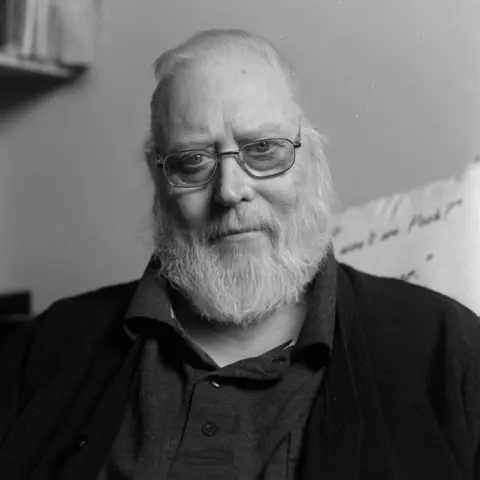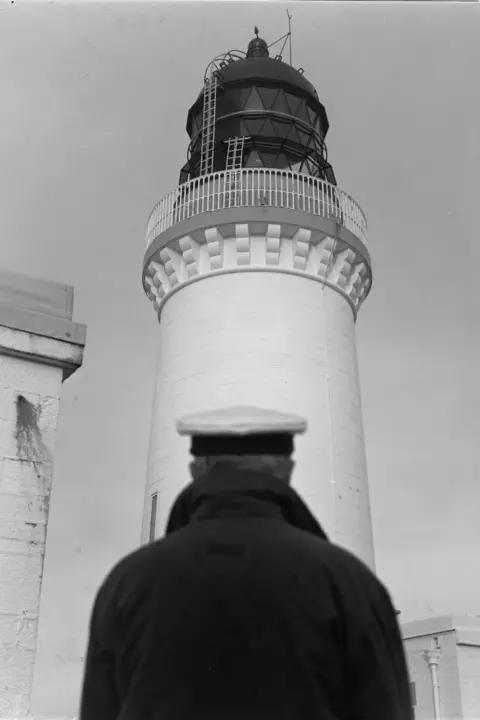I'm looking for all our surviving lighthouse keepers
 Conor Gault
Conor GaultVery few people know what it was like to live and work in a lighthouse, stationed in the outermost reaches of the country, tasked with keeping a lifesaving navigational aid alight.
However, the hardy ones who do will have some unique working memories.
It was growing up surrounded by such experiences that inspired photographer Conor Gault to begin a mammoth project to meet and photograph all the living former Northern Lighthouse Board (NLB) keepers.
Such people are now hard to come by, after the completion of an automation programme in 1998.
 Conor Gault
Conor GaultInstead of a team of lighthouse keepers keeping the lights on in remote coastal locations, the automation meant the beams were instead controlled from a nerve centre in Edinburgh.
Technicians go out to maintain and check them throughout the year and fix any faults.
Conor's grandfather Bill Gault, who is now 83, worked with the NLB as a keeper for more than 30 years.
He was stationed at many remote points of Scotland, including Muckle Flugga in Shetland, Skerryvore in Tiree, and Fair Isle South.
His many duties included maintaining the lights and the lighthouse exterior.
A 25th anniversary event commemorating the automation, at Fraserburgh's Museum of Scottish Lighthouses, lit the flame for Conor's nostalgic idea.
"I met quite a lot of keepers and took their portrait and talked to them," he told BBC Scotland News.
"It kind of kicked off a wee project that I had been thinking about for quite a long time."
'Down to earth guys'
"I started visiting keepers, talking to them, recording memories, and then taking portraits of them in their homes and at the stations they used to work at.
"I'll go away and visit these stations on my own and spend time taking photographs of the locations where these memories that I've recorded have happened.
"It's quite a simple project, but it seems to really be gathering some interest, which is great.
"One thing that I've noticed as well is that they're all just down-to-earth guys."
Two years on, several keepers have already been photographed, and Conor hopes to keep the momentum going.
He is still far from tracing them all, and is not even sure how many are actually still around.
 Conor Gault
Conor Gault"That's one of the most interesting parts of the project for me to be honest, is trying to track down the keepers because it's not like there's a WhatsApp group of them or anything," he said.
"They all live in different ends of the country and they're not like a group of pals, there's no real way of getting in touch with them all at the same time."
"I honestly don't know how many are still around and who would be keen to be part of the project, but I'm just open to hearing from anyone."
He added: "I got an email from a lady whose grandfather used to work as a keeper in Scotland, but they all live in Canada now. And I was like, well, Canada's a bit of a hike for me but it turns out they might be coming to Scotland this summer, so I'm going to be able to photograph him hopefully."
 Conor Gault
Conor Gault"There was this story from a keeper called John Boath and he was working in Maughold Head lighthouse in the Isle of Man," Conor said. "There was a keeper that worked there with him. John and his wife Hazel were leaving the lighthouse, they were posted somewhere else.
"They were driving away from the lighthouse and this guy hadn't been there to see them off and they were confused as to why he wasn't there. Then as they were driving, out the corner of his eye, John saw the guy on the top of a hill with his dog.
"He was an old military man, so he stood and saluted. He got his dog to sit, and John got out of the car and saluted back to him.
"For some reason this story really hit me and it was just those kind of stories that I wanted to replicate in the memories and the photographs."
Conor hopes that one day the photographs will return to their coastal homes.
"I would love to take the portraits of these keepers, print them out nice and big, and then paste them up in the communities that they worked in and lived in.
"Obviously that's a sort of street art element, so it needs to be accepted by the community first."
